
The A/C is cranked and the sweet tea is flowing. Our IMACS Hi-Tech Summer Camp, where kids solve logic puzzles, build electronic circuits, and learn how to program, is in full swing. Summer has definitely arrived at our headquarters in sunny South Florida. Did you ever notice how people from other parts of the country refer to it as “Southern Florida?” Wonder if they say “South California?” Anyhoo, we asked three members of our IMACS family to share their favorite math- or science-related books and movies for our completely informal, very unofficial recommended summer reading and viewing list. They say you can tell a lot about a person by the media they consume, so here’s your chance to get to know Lisa Cunningham, Danielle Ernst and Stephen Flegg.
Lisa Cunningham, Director of Curriculum Training
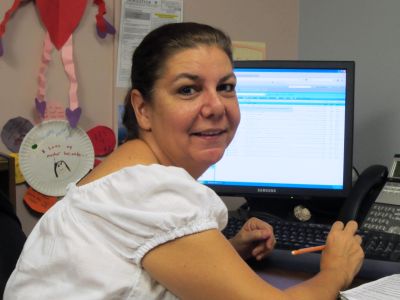
Lisa has an Ed.D. in Curriculum and Instruction from Florida International University and worked many years ago for us as a part-time math enrichment instructor. In our search for someone to head up our ISLAND training, we called Lisa to see if she knew anyone who would be interested. After hearing the job description, she said “What about me?” Lisa jumped at the opportunity, and we are so lucky she did. She also has a daughter who takes math enrichment with us.
Her survey response is below:
“Sure, I’d be happy to participate! I love all things Star Trek because it’s fun to think of what the future could be like, and it is all about the science of things – carbon life forms, tricorders …
I also really like Good Will Hunting. What I like about that movie is that it portrays a brilliant mathematician who would have attended a Title 1 school where, unfortunately, there aren’t as many enrichment opportunities available to foster intellectual and academic growth. As a teacher, it is rare to come across that natural ‘genius’ student who has not been exposed to such opportunities.
As far as books, I would recommend The Science Book. It has some great explanations and wonderful pictures. I use it to reinforce concepts with my daughter or to help her understand the ideas she questions.”
Danielle Ernst, Senior IMACS Instructor
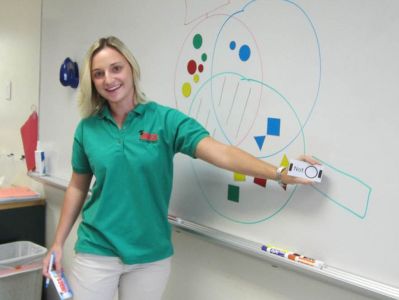
Danielle was an IMACS student from 3rd grade through her high school graduation. During high school she also worked part-time as an IMACS office assistant. Danielle received her BA degree in Mathematics from The Johns Hopkins University. Upon graduation she contacted us about the possibility of working for IMACS and has been with us full time for the past two year. Danielle teaches many of our advanced math enrichment classes as well as our computer programming and virtual robotics classes. She is also involved in developing our new online Virtual Robotics Lab software. There’s nothing like hiring former students. 🙂
Her survey response is below:
“I’d love to be part of the blog! My favorite math book is called An Imaginary Tale by Paul J. Nahin. I read it right after I took a complex analysis course while I was studying abroad in Australia. My professor there was so enthusiastic about the subject that I couldn’t help but enjoy it as well. I found it extremely interesting to read and learn about about a branch of mathematics that only exists in the ‘imaginary’ sense.
My favorite math-related movie is probably A Beautiful Mind. It’s a very moving film with great acting, and it is based upon a real-life mathematician. It was a very popular movie, and I like that it brought a story about mathematics into the mainstream. Now people who never took any math classes after high school know who John Nash is, and so do I!”
Stephen Flegg, Senior IMACS Instructor
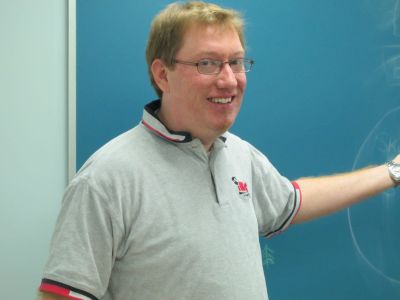
Stephen started teaching for us part-time in 1999 right after he received his BS degree in Physics from Florida Atlantic University and is now on our full-time staff. He teaches our most advanced math enrichment classes and also developed a beginner chess class for our homeschool program. This summer, in addition to teaching the electronics class for our summer camp, Stephen is involved in writing lesson plans for ISLAND. We’re very fortunate that many of our instructors such as Stephen love teaching for us and have been with us for a very long time.
His survey response is below:
“I found it tragically difficult to find some work that would be held up above another as my favorite. In the book category I can give you two books, the first being The Black Cloud by Fred Hoyle; yes, the same Fred Hoyle who made fun of the Big Bang with the name ‘Big Bang,’ and the name then stuck. It is an old novel but very well done and falls into the hard sci-fi genre. Although he takes cheap shots at the Big Bang theory and, by doing so, messes up the theory of evolution, the rest is solid. Those sound like major flaws but not in the context of the story. The next book is called The Age of Wonder by Richard Holmes. This book is a biography of the intellectual history of the 18th and 19th century. I haven’t finished it yet, but I’m loving it nonetheless.
As for movies with math and science, there are many but one seems to always come to mind – 2001: A Space Odyssey by Stanley Kubrick. I was very young the first time I saw the movie, but even at a young age I recognized the attempts to make it realistic even if I had trouble following the story. This became even more obvious when compared with Star Wars, which I also loved as a child. No sound in space, centrifugal force, orbits and many other features awed me then and now.
I was and still am a huge fan of the show Connections by James Burke. It been over for more twenty something years but it is still great.”
Lisa, Danielle and Stephen – thanks for sharing! You’ve given our fans a lot of good stuff to wrap their minds around this summer. Do you, dear reader, have a favorite math- or science-related book or movie that you would like to add to the list?
Add IMACS to your list of top picks. Sign up for our free aptitude test. Follow IMACS on Facebook.
Iain Ferguson works with an IMACS student to program a mobile robot.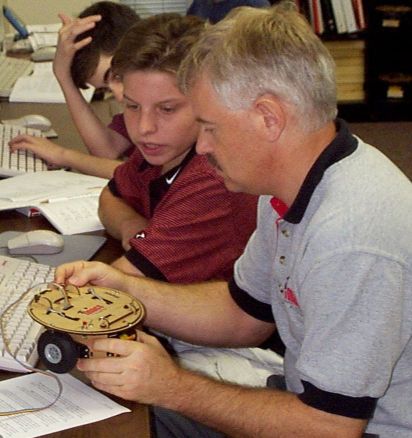
Today, we’re chatting with Iain Ferguson who – in addition to being IMACS’s senior curriculum developer for the computer science program – is the guy behind the sophisticated technology that runs our online computer programming classes. Iain has taught these courses as well, and so brings with him the experience of having seen what works in the classroom and what doesn’t.
Q: Why does your Introduction to Computer Science course use the Scheme programming language? Isn’t the Advanced Placement exam in Java?
A: We start off with Scheme because it’s the most effective for helping students to understand the fundamental concepts of computer science that are common to all programming languages. And we’re not alone in this choice. Graduates of the some of the top universities, including MIT, Yale, Princeton, Johns Hopkins and UC Berkeley, were first taught to program in their freshman year using Scheme.
What we’ve found over 20 years of teaching this course is that if you throw a new student straight into Java, or whatever language the AP exam covers at the time, he or she can easily get mired in its complicated rules of syntax. If you simultaneously try to make a student learn the fundamentals, which are arguably more important, some of those fundamentals just won’t be understood, or they’ll be understood incorrectly. And so the students try to move on to more complicated programming assignments, and they’re hampered by a false understanding of the underlying abstract thinking.
Scheme’s syntax is simple and natural. So it takes our students very little time to pick it up. They use their mental energy instead on developing a deep comprehension of the the abstract mathematical thinking involved in programming. Applying that way of thinking to concrete computer algorithms is then rather trivial for them.
Q: Beyond doing well on the AP exam, how do you know that this approach of teaching Scheme first is working?
A: We hear from a lot of our former students once they’ve gone on to university about how easy their classes are thanks to what and how they learned here. One of my favorite stories is of a student named Erik who went to Virginia Tech. He was taking Computer Engineering in a class of about 600 students, and the first exam was designed to weed out about half of them. So Erik completed the test in 10 minutes with a perfect score. The next day the professor called him in and accused him of cheating. Well, of course, he hadn’t cheated and when he said so, the professor gave him a similar question that was solved just as quickly. Then the professor wanted to know how it was possible for a freshman to have such a deep understanding. Erik told him about learning to program with Scheme, and that was enough to convince the professor that not only had Erik not cheated but that he was also the strongest student in this class of 600.
Q: If Scheme is so beneficial, why don’t more high schools offer it?
A: Their resources are very limited, especially in this economic environment, and the demands on teachers’ time is rather significant. As with most university-level courses, it’s unrealistic to ask high schools to even consider putting resources towards preparing and teaching a class like this. If you really want to do it at a high level, you need instructors with an extensive background in university-level computer science and extensive training in teaching advanced subjects to young adults. Plus you either have to develop the appropriate curriculum or find it and license it. So you’re looking at a lot of time and expense, both of which are, unfortunately, in short supply at the typical high school.
Sounds like a guy who knows his stuff! What language did you use in your first computer programming class, and did it leave you with confusion or clarity?
P.S. If you’re ever in South Florida and want to play a game of Nim, stop by our offices and ask for Iain. He will destroy you, and it won’t hurt a bit!
Make IMACS a part of your program. Sign up for our free aptitude test. Follow IMACS on Facebook.
Terry Kaufman with student at the IMACS Hi-Tech Summer Camp Open House.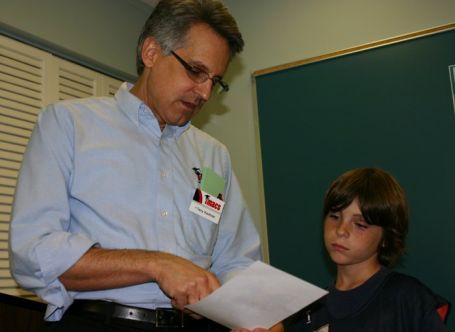
Welcome to the IMACS blog. Check in with us from time to time for mathematical musings and more. Since this is our inaugural blog post, we’ll be utterly predictable and start with the obligatory interview with the president. No, not that president. We mean our very own Terry Kaufman, president, co-founder and all-around good guy, at the Institute for Mathematics and Computer Science, lovingly known as IMACS.
Q: So, Terry, why did you start IMACS?
A: My dad, Burt Kaufman, had been working with mathematically talented students for as long as I can remember, whether it was developing curriculum or teaching them in the classroom. The programs he was involved with ultimately brought him back to South Florida where the Broward County public school system agreed to fund what was then called Mathematics Education for Gifted Secondary School Students (MEGSSS). Project MEGSSS had a successful run in Broward County from 1983 to 1993, but then fell to the budget cutting axe. Well, my oldest child was only two at the time, and I thought to myself, “You know, I really want him to have the benefit of this curriculum.” I’d seen with my own eyes the enthusiasm for math and computer science that my father’s students had when they studied this material. So I said to Ed [Martin] and Iain [Ferguson], our senior curriculum developers for math and computer science who were also teaching MEGSSS students at the time, “Let’s find a way to keep this thing going.” And IMACS was born, really out of a parent’s wish to have high quality math and computer science education available to his child.
Q: What’s the latest news at IMACS? What big goals are you and the team working towards?
A: We’re always working on new online computer courses. One initiative that we’re really excited about is our Online Virtual Robotics Lab in which students program robots in a virtual world. It’s entirely Web-based, but the actual physical behavior of real robots is accurately represented, even the appropriate laws of physics. What we’ve put together is a learning environment that integrates science, technology, engineering and math skills in a very natural way. Several schools are already using it as part of the national STEM Initiative, and we expect that number to grow.
Another of our programs that comes to mind is ISLAND, which stands for Interface for Scientific Learning & Natural Discovery. Here we use computer simulations and some really innovative online activities to encourage students to think scientifically and get involved in the learning process. Rather than simply being told dry scientific facts, they learn by doing – making hypotheses, observing simulations, and then developing scientific theories. They’re so engaged that they don’t realize they’re learning the required state standards. You know, people have traditionally thought of IMACS as a place for gifted and talented students, but the truth is that our teaching philosophy is really applicable to all students. With ISLAND, it’s been very gratifying to be able to share the benefits of our unique approach with a wider audience.
Q: Any message for the lucky folks who stumble upon this blog?
A: Yes! Read it. Share it. Tell us what you think. We are listening. There’s such a strong sense of community among our students, parents, teachers and alumni; it’s time we share that enthusiasm online. Obviously, we’d love for this blog and our Facebook page to be go-to places for people interested in taking online computer programming classes. But more importantly, we know from our many years of teaching mathematically talented students that we have a huge amount of knowledge in our heads on how to bring out the best in them, how to help them reach their full potential. Why keep it there? And we also know that our parents and students have great advice to give too. They share their stories with us face-to-face or in letters all the time. Now there are at least two places where these stories can find a wider audience and maybe help someone who is searching for this kind of information.
If you’ve read all the way to the end of this blog post, then our first attempt couldn’t have been all that bad! Do you have a topic to suggest for our blog? Leave a comment.
Find out if you’re ready for the IMACS experience. Sign up for our free aptitude test. Follow IMACS on Facebook.
« Newer Posts







